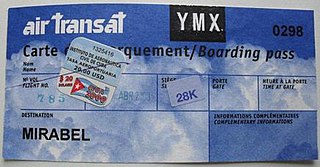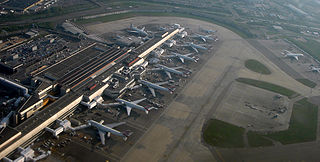Related Research Articles

An airline is a company that provides air transport services for traveling passengers and freight. Airlines utilize aircraft to supply these services and may form partnerships or alliances with other airlines for codeshare agreements, in which they both offer and operate the same flight. Generally, airline companies are recognized with an air operating certificate or license issued by a governmental aviation body. Airlines may be scheduled or charter operators.
RyanairDAC is an Irish budget airline founded in 1984, headquartered in Swords, Dublin, with its primary operational bases at Dublin and London Stansted airports. It forms the largest part of the Ryanair Holdings family of airlines, and has Ryanair UK, Buzz, Malta Air and Lauda as sister airlines. In 2016, Ryanair was the largest European budget airline by scheduled passengers flown, and carried more international passengers than any other airline.

Regional airlines are airlines that operate regional aircraft to provide passenger air service to communities without sufficient demand to attract mainline service. There are two main ways for a regional airline to do business:
- As an affiliated airline, contracting with a major airline, operating under their brand name, and filling two roles: delivering passengers to the major airline's hubs from surrounding towns, and increasing frequency of service on mainline routes during times when demand does not warrant use of large aircraft, known as commuter flights.
- Operating as an independent airline under their own brand, mostly providing service to small and isolated towns, for whom the airline is the only reasonable link to a larger town. Examples of this are PenAir, which links the remote Aleutian Islands to Anchorage, Alaska, and Mokulele Airlines, which operates in the Hawaiian islands.
The freedoms of the air are a set of commercial aviation rights granting a country's airlines the privilege to enter and land in another country's airspace. They were formulated as a result of disagreements over the extent of aviation liberalisation in the Convention on International Civil Aviation of 1944, known as the Chicago Convention. The United States had called for a standardized set of separate air rights to be negotiated between states, but most other countries were concerned that the size of the U.S. airlines would dominate air travel if there were not strict rules. The freedoms of the air are the fundamental building blocks of the international commercial aviation route network. The use of the terms "freedom" and "right" confers entitlement to operate international air services only within the scope of the multilateral and bilateral treaties that allow them.

Aviation safety means the state of an aviation system or organization in which risks associated with aviation activities, related to, or in direct support of the operation of aircraft, are reduced and controlled to an acceptable level. It encompasses the theory, practice, investigation, and categorization of flight failures, and the prevention of such failures through regulation, education, and training. It can also be applied in the context of campaigns that inform the public as to the safety of air travel.

Eastern Airways, legally incorporated as Air Kilroe Limited, is a British regional airline whose head office is at Humberside Airport near the village of Kirmington, North Lincolnshire, England. It operates scheduled domestic and international services and private charter services. Around 800,000 passengers a year are carried on the scheduled route network.

A boarding pass or boarding card is a document provided by an airline during check-in, giving a passenger permission to enter the restricted area of an airport and to board the airplane for a particular flight. At a minimum, it identifies the passenger, the flight number, and the date and scheduled time for departure. A boarding pass may also indicate details of the perks a passenger is entitled to and is thus presented at the entrance of such facilities to show eligibility.
Cabotage is the transport of goods or passengers between two places in the same country by a transport operator from another country. It originally applied to shipping along coastal routes, port to port, but now applies to aviation, railways, and road transport as well.

Airline hubs or hub airports are used by one or more airlines to concentrate passenger traffic and flight operations at a given airport. They serve as transfer points to get passengers to their final destination. It is part of the hub-and-spoke system. An airline operates flights from several non-hub (spoke) cities to the hub airport, and passengers traveling between spoke cities need to connect through the hub. This paradigm creates economies of scale that allow an airline to serve city-pairs that could otherwise not be economically served on a non-stop basis. This system contrasts with the point-to-point model, in which there are no hubs and nonstop flights are instead offered between spoke cities. Hub airports also serve origin and destination (O&D) traffic.
Bermuda II was a bilateral air transport agreement between the governments of the United Kingdom and the United States signed on 23 July 1977 as a renegotiation of the original 1946 Bermuda air services agreement. A new "open skies" agreement was signed by the United States and the European Union (EU) on 30 April 2007 and came into effect on 30 March 2008, thus replacing Bermuda II.

Hosea Kutako International Airport is the main international airport of Namibia, serving the capital city Windhoek. Located well east of the city, 45 km (28 mi), it is Namibia's largest airport with international connections. The name of the airport comes from Namibian national hero Hosea Kutako.

Boryspil International Airport is an international airport in Boryspil, 29 km (18 mi) east of Kiev, the capital of Ukraine. It is the country's largest airport, serving 65% of its passenger air traffic, including all its intercontinental flights and a majority of international flights. It is one of two passenger airports that serve Kiev along with the smaller Zhuliany Airport. Boryspil International Airport is a member of Airports Council International.

The environmental impact of aviation occurs because aircraft engines emit heat, noise, particulates and gases which contribute to climate change and global dimming. Airplanes emit particles and gases such as carbon dioxide, water vapor, hydrocarbons, carbon monoxide, nitrogen oxides, sulfur oxides, lead, and black carbon which interact among themselves and with the atmosphere.

The Flight Compensation Regulation is a regulation in EU law establishing common rules on compensation and assistance to passengers in the event of denied boarding, flight cancellations, or long delays of flights. It requires compensation of €250 to €600 depending on the flight distance for delays over of at least 2 hours, cancellations, or being denied boarding from overbooking. Delays shorter than two hours means no entitlement to any compensation of any kind even if the delay was classified as non-extraordinary. Airlines must provide refreshments and accommodation where appropriate. The Court of Justice of the European Union has interpreted passenger rights strictly, so that there are virtually no exceptions for airlines to evade their obligations for breach of contract.
The EU–US Open Skies Agreement is an open skies air transport agreement between the European Union (EU) and the United States. The agreement allows any airline of the European Union and any airline of the United States to fly between any point in the European Union and any point in the United States. Both EU and US airlines are allowed to fly on to a further destination in another country after their initial stop. Because the EU is not treated as a single territory for the purposes of the Agreement, this means in practice that US airlines can fly between two points in the EU as long as that flight is the continuation of a flight that started in the US. Airlines of the European Union are also allowed to fly between the United States and non-EU countries that are part of the European Common Aviation Area, like Switzerland. EU and US airlines can operate all-cargo flights under Seventh Freedom rights, meaning US airlines' all-cargo flights can be operated from one EU country to any other country and EU airlines' all-cargo flights can operate between the US and any other country. Norway and Iceland acceded to the Agreement from 2011 and their airlines enjoy the same rights as EU airlines.

Air transport in the United Kingdom is the commercial carriage of passengers, freight and mail by aircraft, both within the United Kingdom (UK) and between the UK and the rest of the world. In the past 25 years the industry has seen continuous growth, and the demand for passenger air travel in particular is forecast to increase from the current level of 236 million passengers to 465 million in 2030. One airport, London Heathrow Airport, is amongst the top ten busiest airports in the world. More than half of all passengers travelling by air in the UK currently travel via the six London area airports. Outside London, Manchester Airport is by far the largest and busiest of the remaining airports, acting as a hub for the 20 million or so people who live within a two-hour drive. Regional airports have experienced the most growth in recent years, due to the success of 'no-frills' airlines over the last decade.

The so-called "Emirates business model" is the business model that lies at the heart of Emirates's commercial success. Its main ingredients are a lean workforce comparable to a low-cost carrier and a flat organisational structure that allows the airline to maintain low overhead costs.

Jinnah International Airport, formerly Drigh Road Airport, is Pakistan's busiest international and domestic airport, and handled 6,697,073 passengers in 2017-2018. Located in Karachi, the largest city and commercial capital of Pakistan and capital of the province of Sindh, it is named after Muhammad Ali Jinnah, the founder of Pakistan.

A flight delay is when an airline flight takes off and/or lands later than its scheduled time. The Federal Aviation Administration (FAA) considers a flight to be delayed when it is 15 minutes later than its scheduled time. A cancellation occurs when the airline does not operate the flight at all for a certain reason.

The COVID-19 pandemic has had a significant impact on the aviation industry due to the resulting travel restrictions as well as a slump in demand among travelers.
References
- ↑ Airline Hassles On Rise - News - MSNBC.com
- ↑ USATODAY.com - Today In the Sky: Archives Archived 2007-09-07 at the Wayback Machine
- ↑ USATODAY.com - Speak up: How to file your airline complaints
- ↑ "AirportBusiness.com » Article » Airline Passenger Complaints Up Sharply". Archived from the original on 2006-10-23. Retrieved 2007-06-03.
- ↑ BBC NEWS | Business | Air passengers win new EU rights
- ↑ Airline complaints soar | Money | guardian.co.uk
- 1 2 Complaints to airlines rocket after new EU rules - Home News, UK - Independent.co.uk Archived 2007-10-01 at the Wayback Machine
- ↑ Travel: Flight Tracker, City Guides, Deals, News, Photos & more - USATODAY.com
- ↑ Airline Passenger Revolt Spreads to Europe